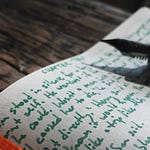One of the things that kicked all of this off and made it possible to do Fictionsmith Family was because of a noticing of a small detail that I had missed after passing it by dozens upon dozens of times.
My oldest daughter, who was six at the time, saw a mailbox sitting on an otherwise empty grassy lot and came up with the idea of an invisible house.
I had walked along that sidewalk countless times as I would train for half-marathons or just wanted to get my steps in for that day. I was always rushing, always focused either on getting the run over with or with handling a work email on my phone.
When she noticed the mailbox, I was looking at my phone, handling something for work.
I didn't have my imagination engaged the way she had.
I truly believe that one of the reasons we'll look back and say 'wow, the time just flew by. Where did it go?' is due to how much we fall into the same routines, or do the same things over and over.
If we've traveled the same route countless times, we're not looking out for the uneven piece of sidewalk that we've almost tripped over before, or the smell of the honeysuckle bushes we've stopped at once before.
Part of making it more efficient for our brains does allow us to focus on other things we need to pay attention to, but I think if we don't stop and actively look at our surroundings, there is so much we are missing out on because we could be taking in new and amazing things, especially if we apply our imaginations to them.
When my daughter and I had decided we were going to start writing a book together, we took noticing walks.
The activity was simple: Find ten things you've never noticed before in our neighborhood.
Sometimes that means you might need to walk a different path than you usually do. Or you may have to look closer at details around things you usually glance at.
The beauty of the exercise is that it makes us more present, and it also helps train us in ways to communicate what we are seeing, feeling, smelling, hearing, etc.
Adding in little details like that help bring a reader more fully into a story, and if you're showing them your neighborhood or trying to transport them into a moment that you are currently experiencing, that is a form of time travel.
The better we can add in little details from what we notice around ourselves, the more vivid and alive we get to engage the imagination of the reader to transport them into their own version of our experience.
And the better we can bring them into our world, the easier it is to tap into empathy of what it feels like to be another person. The more empathy, the easier it is to act with kindness as someone who might be a little bit different than you suddenly doesn't feel like they are 'the other.'
Let's take a step back and do a practice run.
As I'm sitting here writing this in my office, I want to try and bring you into my moment. I'm going to close my eyes and write down three layers of description and see what comes to mind for you.
As I sat in my chair and typed on my typewriter, the room felt peaceful.
Between the clacking of typewriter keys, the peace was barely disturbed by the rumble of thunder from the storm outside.
I took a deep breath, squeezing my eyes shut and focusing on the sound of the storm as the rain pattered against the rocks outside my window. The thunder was faint enough to still let in the traffic noise from the highway at the end of my neighborhood street.
Not every moment in a book needs to be super descriptive, but as you go along you'll realize that adding in a few details here and there won't derail your story and will instead allow your reader to latch onto things that will bloom in their own imagination.
Also, what they imagine will probably be very different than what you are imagining, and there is absolutely nothing wrong with that. As long as it doesn't detract from the story, it's totally fine to have those differences.
Even outside of the realm of story, being able to notice things and communicate with each other effectively is a very important life skill.
Activity: The Noticing Walk
This is something my daughter and I did early on in the process of telling our stories together when we were looking for little details to sprinkle into the story.
What I want you to do is to go to a place that is very familiar to you. Could be a park or your neighborhood, or a store, or wherever you've both been to often enough that you could space out and not realize time has passed.
I want you to cycle through the senses, trying to notice something that you've never spotted before.
First, each identify something you haven't seen before and share it with the other. Then describe how you would put it into your book (if it would go in there) in a sentence. Notice the color, the shape, the way the light hits it. Anything that would be new to you and help you to have a reader imagine it as accurately as they can.
Next, listen closely. What do you hear that you haven't noticed before? Is there a nearby highway with traffic in the distance? Are the birds out and about and calling to each other? What do your shoes sound like when you walk?
What do you smell? You'd be surprised how effective adding in scents into a story can be to make it all feel more real. Often we kind of stop with what we see and hear like we're just watching a movie, but including more of your sense help put the reader more firmly into the moment.
I won't ask you to taste anything unless you're going out for dinner afterward.
For bonus points, either 'how did that get there?' or ‘what if the thing I just noticed...’ and fill in the blank with something fantastical that you wouldn't expect.
I mentioned earlier that we turned a little lending library by our neighborhood pool into a place where someone mysterious left a message. We also took the trails into a wooded section by our home and came up with the idea of gnome houses and why someone would create those for decoration (or for hiding small treasures).
Overall, I hope you're able to be present, notice the world around you more, and get to take that habit and pay attention to things you've closed yourself off from noticing because you've been there a million times.
There's a lot to see if you keep your eyes open.
I hope your story is starting to shape up and that you are getting to know your characters and setting even better as your story progresses!
See you next time.













Share this post